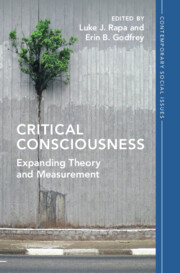Book contents
- Critical Consciousness
- Contemporary Social Issues
- Critical Consciousness
- Copyright page
- Dedication
- Contents
- Figures
- Tables
- Contributors
- Acknowledgments
- Introduction Critical Consciousness Theory and Measurement
- Part I Theory
- 1 Synthesizing Critical Consciousness and Identity-Based Motivation to Clarify How Youth of Color Navigate and Challenge Racial Capitalism
- 2 Situating Critical Consciousness Within the Developmental System
- 3 Integrating Critical Consciousness and Social Empathy
- 4 Critical Consciousness in Early to Middle Childhood
- 5 Adolescents’ Developmental Pathways to Critical Consciousness in the Contexts of Racial Oppression and Privilege
- 6 Making Reflection Critical
- Part II Measurement
- Conclusion Expanding Critical Consciousness Theory and Measurement
- Index
- References
5 - Adolescents’ Developmental Pathways to Critical Consciousness in the Contexts of Racial Oppression and Privilege
from Part I - Theory
Published online by Cambridge University Press: 20 April 2023
- Critical Consciousness
- Contemporary Social Issues
- Critical Consciousness
- Copyright page
- Dedication
- Contents
- Figures
- Tables
- Contributors
- Acknowledgments
- Introduction Critical Consciousness Theory and Measurement
- Part I Theory
- 1 Synthesizing Critical Consciousness and Identity-Based Motivation to Clarify How Youth of Color Navigate and Challenge Racial Capitalism
- 2 Situating Critical Consciousness Within the Developmental System
- 3 Integrating Critical Consciousness and Social Empathy
- 4 Critical Consciousness in Early to Middle Childhood
- 5 Adolescents’ Developmental Pathways to Critical Consciousness in the Contexts of Racial Oppression and Privilege
- 6 Making Reflection Critical
- Part II Measurement
- Conclusion Expanding Critical Consciousness Theory and Measurement
- Index
- References
Summary
Dismantling systems of racial oppression requires that people from many different racial and ethnic backgrounds become critically conscious in challenging racial injustices. Youth’s pathways to critical consciousness may be very different depending on youth’s experiences with racial oppression and privilege. This chapter brings together relational developmental systems and critical race and intersectionality theories and existing research that can offer insights into different underpinnings and processes related to youth of color and white youth’s critical consciousness development. We also show how mapping complex variations in critical reflection, motivation, and action and situating these processes within contexts of oppression and privilege can advance understanding of critical consciousness development. We conclude by summarizing promising future directions for theory and research.
Keywords
- Type
- Chapter
- Information
- Critical ConsciousnessExpanding Theory and Measurement, pp. 120 - 144Publisher: Cambridge University PressPrint publication year: 2023
References
- 1
- Cited by

